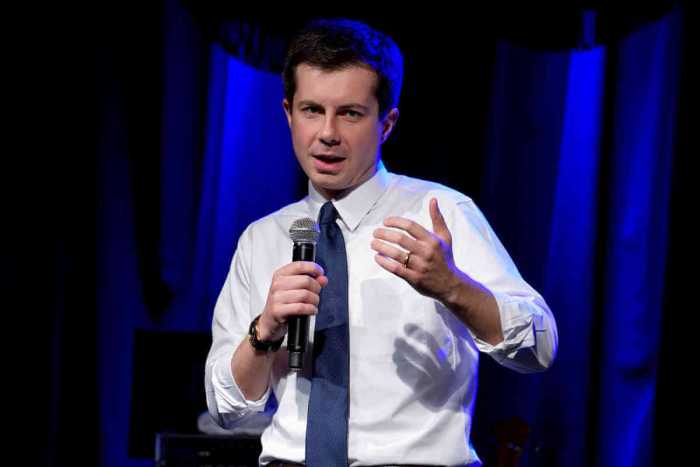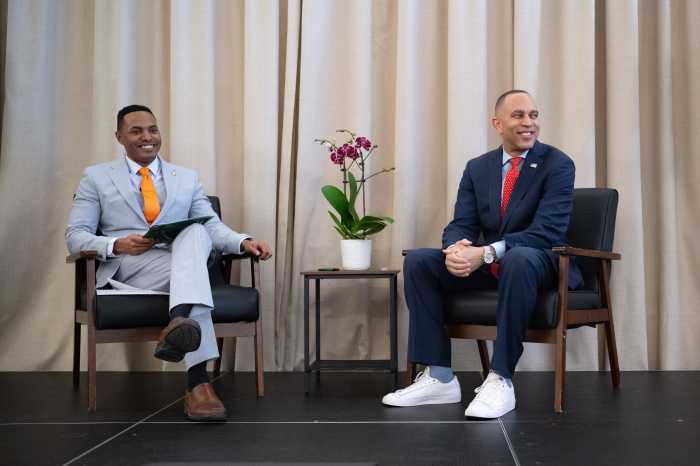With President Donald Trump’s nomination of Brett Kavanaugh hanging in the balance, the US Supreme Court begins its new term, running through next June, on October 1. This week, this court has been holding its “long conference,” during which the justices consider the extensive list of petitions for review filed since last spring. They are beginning to assemble their docket of cases for argument once those cases granted review late in the term that ended in June are heard.
Several petitions involving significant LGBTQ questions are pending before the court, but it is unlikely there will be announcement about any of them until late October or November at the earliest.
Three of those petitions raise one of the most hotly contested LGBTQ issues being litigated in the lower federal courts: whether Title VII of the 1964 Civil Rights Act, which prohibits employment discrimination because of an individual’s sex, should be interpreted to extend to claims of discrimination based on sexual orientation or gender identity. One of the three cases also raises the question whether an employer with religious objections to gender transition has a defense against a discrimination claim under the Religious Freedom Restoration Act.
Although many state civil rights laws ban sexual orientation and gender identity discrimination, a majority of states do not, so the question whether federal law applies is particularly significant in the South and Midwest, where state courts cannot redress such discrimination. Even in New York State, gender identity discrimination claims are protected by executive directive, not in state law.
When Trump nominated Kavanaugh this summer to replace Justice Anthony M. Kennedy, the Republican leadership in the Senate was confident it could complete the confirmation process in time to seat a ninth justice for the new term. Now, with the emergence of sexual misconduct accusations against the nominee, the eight justices, four of whom must agree to accept a case for review, are considering cases in their long conference on which they are likely evenly divided without knowing who the ninth justice will be.
Cases Where Review Petitions Are Filed
In Bostock v. Clayton County Board of Commissioners, a three-judge panel of the Atlanta-based 11th Circuit Court of Appeals affirmed a decision by the Northern District of Georgia to dismiss Gerald Lynn Bostock’s Title VII claim alleging employment discrimination because of his sexual orientation. The appeals panel found that it was bound by prior circuit precedent, a 1979 ruling that was reaffirmed last year by a panel of the 11th Circuit in Evans v. Georgia Regional Hospital — involving lesbian Jameka Evans’ job discrimination claim — which was denied review last December by the Supreme Court. Three-judge panels are required to follow circuit precedents, which can be overruled only by an en banc court — including all members of the circuit bench — or the Supreme Court.
The 11th Circuit panel also noted that Bostock had “abandoned any challenge” to the district court’s dismissal of his alternative claim of sex discrimination based on gender stereotyping. In 2011, an 11th Circuit panel ruled in Glenn v. Brumby that a transgender plaintiff could bring a sex discrimination claim under a gender stereotyping theory, relying on a Supreme Court ruling from 1989, in Price Waterhouse v Hopkins, which held that requiring employees to conform to a stereotyped view of how women and men should act and appear was evidence of discrimination based on sex. The Bostock court noted that in the Evans case, a majority of the 11th Circuit panel rejected extending the same theory to uphold a sexual orientation claim. This is also now binding 11th Circuit precedent.
Bostock sought en banc reconsideration of the panel decision by the circuit’s full 11-member bench, but he also filed a petition with the Supreme Court on May 25. On July 18, the 11th Circuit, in a 9-2 vote, denied the petition for en banc rehearing. Circuit Judge Robin Rosenbaum, who was the dissenting member of the three-judge Evans panel, released a dissenting opinion, joined by Circuit Judge Jill Pryor.
Despite the constraints of precedent on the Evans and Bostock three-judge panels, recent developments persuaded the dissenters that the issue raised in this case “is indisputably en-banc-worthy. Indeed,” continued Rosenbaum, “within the last fifteen months, two of our sister Circuits have found the issue of such extraordinary importance that they have each addressed it en banc…. No wonder. In 2011, about 8 million Americans identified as lesbian, gay or bisexual,” citing a demographic study published by the Williams Institute at UCLA Law School. “Of those who so identify, roughly 25 percent report experiencing workplace discrimination because their sexual preferences do not match their employers’ expectations. That’s a whole lot of people potentially affected by this issue.”
The other case pending before the Supreme Court presenting the same question, but this time appealing from the employer’s side, is Altitude Express v. Zarda, from the New York-based Second Circuit. A three-judge panel initially affirmed the district court’s decision to dismiss a Title VII sex discrimination claim by Donald Zarda, a gay sky-diving instructor, who in April 2017 based his claim on alternative assertions of gender stereotyping and sexual orientation discrimination. While the case was pending, Zarda died in a sky-diving accident but his estate stepped in to continue the lawsuit. Second Circuit Chief Judge Robert Katzmann, attached a concurring opinion to the appellate panel ruling, calling for the circuit to reconsider the issue en banc, noting, among a number of developments, a then-recent ruling by the Chicago-based Seventh Circuit in Hively v. Ivy Tech Community College, a favorable ruling for lesbian instructor Kimberly Hively’s employment discrimination claim against an Indiana school.
Zarda’s Estate sought and obtained that en banc review, resulting in the Second Circuit’s decisive repudiation of its past precedent on February 26 of this year. Katzmann’s opinion for the en banc court found that discrimination because of sexual orientation is, at least in part, discrimination because of sex, and so falls under Title VII. Altitude Express filed a Supreme Court petition on May 29. Consistent with positions previously announced by Attorney General Jeff Sessions, the Trump administration disagrees with the Second Circuit’s en banc ruling and would likely seek to participate in any oral argument in Bostock or Altitude Express.
The third pending Title VII petition, in Equal Employment Opportunity Commission v. R.G. & G.R. Harris Funeral Homes, Inc., comes from the Cincinnati-based Sixth Circuit, where a three-judge panel ruled on March 7 that the funeral home’s discharge of transgender funeral director Aimee Stephens violated Title VII. The American Civil Liberties Union represents Stephens.
The EEOC, the federal agency with oversight for enforcement of Title VII, ruled years ago that it considered discrimination because of gender identity or gender transitioning to be discrimination based on sex, and it initiated the lawsuit in the Eastern District of Michigan. Stephens intervened as a co-plaintiff. Although the district judge accepted the EEOC’s argument that this could be a valid sex discrimination case using the gender stereotyping theory, he concluded that the funeral home had a right under the Religious Freedom Restoration Act (RFRA) to be free of government prosecution, because of the burden it placed on its owner’s religious beliefs.
The Sixth Circuit affirmed that ruling in part and reversed it in part. In an opinion by Circuit Judge Karen Nelson Moore, the court agreed with the district judge that gender identity discrimination can be the basis of a Title VII claim, but the court went a step further than prior panel opinions by deciding, as the EEOC had argued, that discrimination “because of sex” inherently includes discrimination against employees who are transgender, without any need to analyze the question of gender stereotyping.
The court of appeals reversed the district court’s ruling on the RFRA defense, finding that requiring the owner to continue employing a transgender funeral director would not substantially burden his right to free exercise of religion. The court specifically rejected the owner’s argument that customers’ presumed discomfort with a transgender funeral director is a legitimate justification for firing Stephens.
The Alliance Defending Freedom (ADF), the anti-gay religious right litigation group representing the funeral home, is seeking Supreme Court review of the Sixth Circuit ruling, but the US Solicitor General’s Office received several extensions in filing its response in the case, so it was not ready for review in this week’s pre-term long conference by the justices. The solicitor general would likely urge the high court to take the case and reverse the Sixth Circuit.
The EEOC, however, is the plaintiff in the case, and the majority of that agency is still not made up of Trump appointees and it continues to view gender identity discrimination as covered by Title VII. Neither the solicitor general nor the EEOC has yet announced who will be filing a response on behalf of the government — and what position the government will take.
ADF sent a letter to the Supreme Court on September 13 suggesting that because the three Title VII petitions present common questions of statutory interpretation they should be considered together. The court then removed the Bostock and Altitude Express v. Zarda cases from the agenda for this week’s long conference, which is why we may not hear any word on any of the Title VII cases for several months.
It would be very surprising if the court did not grant the petitions in the Altitude Express and Harris Funeral Homes cases, since both appellate rulings extend existing splits in circuit court interpretations of Title VII, the nation’s basic employment discrimination statute, and employ reasoning potentially affecting interpretation of other federal sex discrimination statutes, such as the Fair Housing Act, the Equal Credit Opportunity Act, Title IX of the Education Amendments Act, and the Affordable Care Act.
But with the Kavanaugh matter unsettled — and the possibility of a protracted even divide on the court between Democratic and Republican appointees — both camps could well shy away from taking on cases where a tie vote would affirm a lower court ruling without establishing a nationwide precedent.
There are other controversies brewing in the lower courts that could result in Supreme Court petitions in the upcoming term. Following its Masterpiece Cakeshop decision on June 4, the Court vacated a decision by the Washington State Supreme Court against a florist who refused to provide decorations for a same-sex wedding, sending the case back for reconsideration in light of Masterpiece. This is one of several pending cases — some in federal courts of appeals or state supreme courts — that raise the question of religious freedom exemptions from complying with anti-discrimination laws.
The Supreme Court’s evasion of the underlying issue in Masterpiece means that it will come back to the Supreme Court, possibly this term, especially since some courts — in cases involving wedding cakes, invitations, and videos — have already seized upon Justice Kennedy’s language in his opinion observing that the high court has never recognized a broad religious exercise exemption from complying with anti-discrimination laws.
In a different arena, the court recently denied a request by Catholic authorities in Philadelphia to temporarily block that city from suspending referrals of children to a Catholic adoption agency that refuses to deal with same-sex couples. The federal district court upheld the city’s position, as Gay City News previously reported, finding a likely violation of Philadelphia’s public accommodations ordinance that covers sexual orientation and rejecting an exemption for the Catholic adoption agency.
Litigation continues over a claim by some Houston Republicans that the city is not obligated to provide equal benefits to the same-sex spouses of Houston employees. The case is pending before a state trial judge after the Texas Supreme Court, in a blatant misinterpretation of the 2015 Obergefell marriage equality decision, held that the US Supreme Court had not necessarily decided the issue, despite the fact that the Obergefell opinion specifically mentioned insurance among a list of the important reasons why same-sex couples had a strong interest in being able to marry, making marriage a fundamental right. Last year, the US Supreme Court specifically quoted from that list in Pavan v. Smith, where it reversed the Arkansas Supreme Court holding that Obergefell did not decide the question whether same-sex parents had a right to be listed on birth certificates.
Before long the high court will probably also take up the question whether transgender public school students have a right under Title IX of the Education Amendments of 1972 and the Equal Protection Clause to use restroom and locker room facilities consistent with their gender identity. The Trump administration backed off the Obama era interpretation that Title IX protects trans students, who continue to assert their rights in lawsuits, while religious litigation groups such as ADF oppose school district policies that honor their students’ gender identities.
Another candidate for Supreme Court review is Trump’s transgender military service ban, first tweeted in July 2017. The issue that may bring it up to the court quickly is the government’s refusal to comply with pre-trial discovery orders, in which plaintiffs in the four pending challenges are seeking details about the alleged basis for the ban, noting Trump’s vague reference to having consulted “my generals and military experts” before his tweet, as well as the undisclosed identity of the members of Defense Secretary James Mattis’ task force that produced the policy the president authorized him to implement this past March.
Preliminary injunctions from the four district judges have kept the ban from going into effect and required the Defense Department to accept applications from transgender people as of this past January 1. On September 18, District Judge Jesus Bernal in Riverside, California, became the fourth district judge to refuse to dissolve a preliminary injunction against the policy. Seattle District Judge Marsha Pechman’s discovery order is being appealed to the Ninth Circuit Court of Appeals.
If any one of these four judges grants the plaintiffs’ motion for summary judgment, of course, the government will appeal and the case may end up in the Supreme Court, perhaps providing the vehicle for the court to determine the extent to which government discrimination against transgender people violates the Fifth Amendment’s equal protection requirement.




































